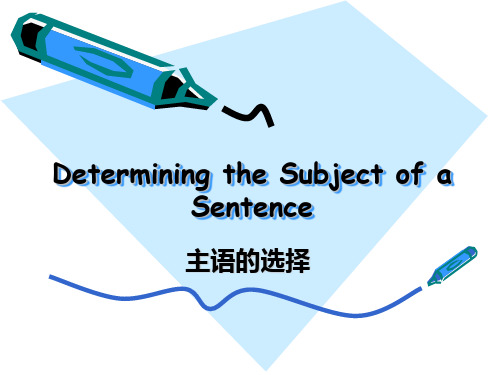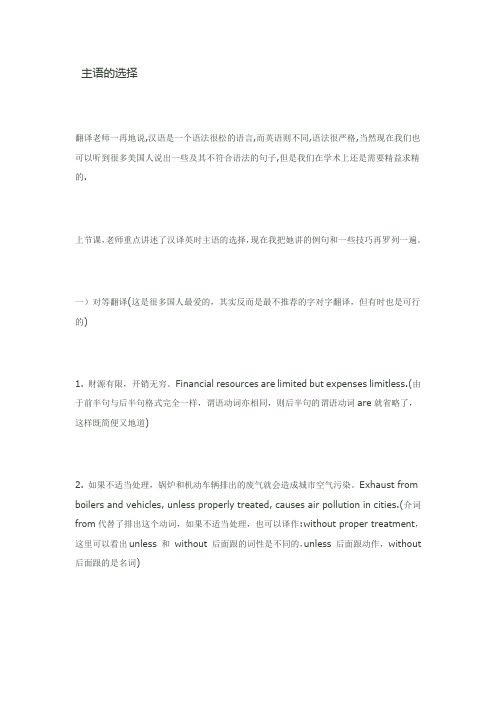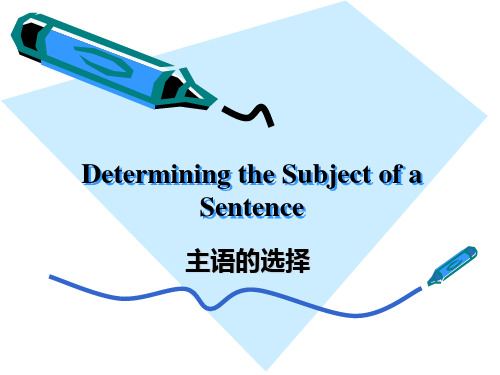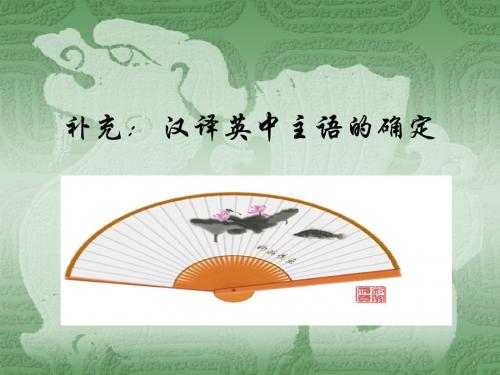主语的选择
汉译英之主语的选择全解课件

在汉语中,无主句和省略主句是比较常见的句型,但在英语中,无主句和省略主句的使用相对较少。在汉译英中 ,需要根据英语的表达习惯对无主句和省略主句进行处理,可以采用增补主语、变换句型等方法,使得译文更加 符合英语的表达习惯,提高译文的准确性和流畅性。
汉译英主语选择的
03
方法与技巧
直译法
总结词
功能
主语在句子中起到引导句子的作 用,是句子逻辑和语义的核心, 同时影响谓语和宾语的语法结构 和意义。
主语选择的重要性
01
02
03
语法正确性
选择正确的主语可以使句 子语法结构完整,避免出 现语法错误。
语义清晰性
选择合适的主语可以明确 动作的执行者或状态的变 化者,使句子的语义更加 清晰。
语境适应性
详细描述
在汉译英过程中,有时候原文中的一些词汇或短语在英文中并不需要翻译出来,因为它 们对于句子的结构和意义没有实质性的影响。省略法可以在主语选择时使用,例如在翻
译一些重复的词汇或短语时,可以省略其中的一部分,以使译文更加流畅、自然。
汉译英主语的特殊
04
处理
主谓一致的处理
主谓一致是指英语句子中主语和谓语动词在数、时态和语态上保持一致。在汉译 英过程中,需要根据英语语法规则,选择适当的主语形式,以确保句子结构正确 。
主语与谓语逻辑关系混乱
主语与谓语逻辑关系混乱是指英语主语与谓 语在逻辑上不一致,导致句子意义不明确。
在进行汉译英时,需要特别注意主语与谓语 的逻辑关系,确保它们在时态、语态和语气 等方面保持一致。例如,“如果明天下雨, 我们就不去公园了”应该翻译为“If it rains tomorrow, we won't go to the park”,
翻译_主语的选择

汉语主语(被陈述的话题)
• 汉语主语是谓语说明的对象,可以是名词、代 词、数词、量词,或者动词短语、主谓短语等, 如:
• • • • • • • 1 2 3 4 5 6 7 这本杂志我不看了。 那边正在卖冰激凌。 西瓜吃完了。 小和山顶上开了一家酒吧。 这么快就挂了? 那个班的同学,十有八九是德国人。(外位语) 这些教材我们自学很容易。
5. 得第一名获金牌,第四名什么也拿 不到
Whoever comes first wins a gold medal but anyone who comes fourth
gets nothing.
• 6 不要有了新亲,把旧亲忘个干净!这种 没良心的人我见多了!--《围城》
• Once you have new relatives, don’t forget the old ones. I’ve seen too many such ungrateful people.
英美人则较强调客观,注重客观事物对人的影 响和作用,因此无生命、抽象的名词作主语远 比汉语中多。英语这类非人称主语句采用“无 灵主语” (inanimate subject),表示抽象概念、 心理感觉、事物名称或时间地点等,但谓语却 常常使用“有灵动词” (animate verb),表示人 或社会团体的动作和行为,如 see , find , bring , give , escape , surround , kill , deprive , seize , send , know , tell , permit , invite , take , drive , prevent. . . from等。
1. 2
主语选择的原则
主语的选择

主语的选择翻译老师一再地说,汉语是一个语法很松的语言,而英语则不同,语法很严格,当然现在我们也可以听到很多美国人说出一些及其不符合语法的句子,但是我们在学术上还是需要精益求精的.上节课,老师重点讲述了汉译英时主语的选择,现在我把她讲的例句和一些技巧再罗列一遍。
一)对等翻译(这是很多国人最爱的,其实反而是最不推荐的字对字翻译,但有时也是可行的)1. 财源有限,开销无穷。
Financial resources are limited but expenses limitless.(由于前半句与后半句格式完全一样,谓语动词亦相同,则后半句的谓语动词are就省略了,这样既简便又地道)2. 如果不适当处理,锅炉和机动车辆排出的废气就会造成城市空气污染。
Exhaust from boilers and vehicles, unless properly treated, causes air pollution in cities.(介词from代替了排出这个动词,如果不适当处理,也可以译作:without proper treatment,这里可以看出unless 和without 后面跟的词性是不同的,unless 后面跟动作,without 后面跟的是名词)3. 这些新政策将使人民的购买力提高,市场繁荣,金融活跃,绝不会如一些人所说将国家财政搞得一团糟。
Theses new policies will increase the people's purchasing power and lead to thriving financial and commercial conditions rather than make a mess of the country's finances as some people say.(这里有一个“使”字句的翻译技巧,直接用使什么变成什么样中“什么样”这个形容词的动词形式作了谓语。
翻译_主语的选择

七大主要英语的主语
5. 时间主语 (temporal subject): Yesterday was Monday. 6. 事件主语 (eventive subject): The dispute over the problem lasted a decade. 7. it作主语,表时间、气候或距离: It is very late. It’s very hot in summer here. It 作形式主语: It is impossible to finish the paper in ten minutes.
七大主要英语的主语
1. 施动主语 (agentive subject): Susan is growing flowers. 2. 受动主语 (affected subject): Her books translate well. 3. 工具主语 (instrumental subject): A stone broke the glass. 4. 地点主语 (locative subject): The jar contains honey.
4. 只可惜宫粉涂不平脸上的皱纹,看起来好 像驴粪蛋上下了霜。 *Unfortunately powder could not smooth over her wrinkled face; it looked 1ike a frosted donkey turd. Unfortunately powder could not smooth over her wrinkled face. It only made it look like a frosted donkey turd.
1. 2
主语选择的原则
① 无主句必须添加必要的主语 ② 必须是句中应该突出的信息; ③ 必须符合英美人的思维视角; ④ 必须符合英语的逻辑搭配习惯; ⑤ 必须符合行文连贯的需要。
论在汉译英中主语的选择 ——以张培基《英译中国现代散文选》为例

论在汉译英中主语的选择——以张培基《英译中国现代散文选》为例摘要翻译是两种语言间相互转换的语言活动。
在汉译英中,我们面临的任务之一是选择合适的词做主语。
然而,由于英汉语言间存在较大差异,我们在汉译英过程中选择主语并不容易。
汉英主语在形式和构句方面存在差异,而且汉语注重话题而英语注重主语。
本文从对这些差异的分析入手,通过对张培基《英译中国现代散文选》的学习以及本人自身的实践和总结,在汉译英主语选择方面提出了一些方法和建议。
一、保留原文主语作译文主语,二、选择原文的其他句子成分作译文主语,三、在译文中增补主语,四、减少改变主语。
进而得出结论。
在汉译英选择主语时,我们应该现在英美人的思维方式上考虑,结合英语的语言习惯,充分理解原文,运用一些技巧选择合适的主语。
关键词:汉译英;主语的选择;英汉主语的差异;张培基;英译中国现代散文选AbstractTranslation is a language activity of transforming between two languages. In the process of Chinese-English translation, choosing the suitable words as subjects is one of the tasks people facing with. However, it's not easy for people to choose subjects in Chinese-English translation because of the differences between Chinese and English. The subjects of Chinese and English have differences in forms and sentence structure. Furthermore, Chinese is topic-prominent language and English is subject-prominent language. This thesis begins with these differences, puts up some methods and advises about how to choose a suitable subjects through learning Selected Modern Chinese Essays by Zhang Peiji and the author own practices and conclusion. First, keeping the subjects of the original sentences. Second, choosing other constituents of the original sentences. Third, replenishing new subjects for the translation. Fourth, reducing of changing the subjects. And then, the writer shows the conclusion that it should be considered the mode of thinking in western countries, combining with the English language habits, fully understanding the origin text, and use some skills to choose the appropriate subjects.Key words: Chinese-English Translation;the choice of subjects;the differences of subjects in English and Chinese;Zhang Peiji;Selected Modern Chinese EssaysContentsAbstract (I)1.Literature Review 01.1 Existing Researches on this Topic 01.2 Purposes and importance of the study 02. Differences between Chinese and English Subjects (1)2.1 In Forms (1)2.2 Topic-prominent Language vs. Subject-prominent Language12.3 In Sentence Structure (2)3. Methods of Choosing the Subjects in Chinese-English Translation 23.1 Keep the Subjects of the Original Sentences (3)3.2 Choose other constituents of the Original Sentences (3)3.2.1 Choose the Objects to be the Subjects (4)3.2.2 Choose the Adverbials to be the Subjects (4)3.2.3 Choose the Attributives to be the Subjects (6)3.2.4 Choose the Predicates to be the Subjects (6)3.3 Replenish New Subjects for the Translation (6)3.3.1 Replenish the Suppressed Subjects of the Original .. 73.3.2 Replenish the Impersonal Pronoun “It” (7)3.4 Reduce of Changing the Subjects (8)4. Conclusion (9)Bibliography (10)Acknowledgements (10)1.Literature Review1.1 Existing Researches on this TopicMany scholars discussed the translation of Chinese and English sentences from the perspective of differences between Chinese and English subjects. According to the existing research, there are many different forms of expression between Chinese and English, which can be divided into topic-prominent language and subject-prominent language, covert subject and overt subject, parataxis and hypotaxis in sentence structure, personal subject and impersonal subject. These studies focus on the analysis of subjective differences between Chinese and English languages, but the discussion of subjects in Chinese-English translation is relatively less detailed. In the book Chinese-English Translation Studies and Practice written by Ji Dequan (2005: 105), who puts forward five principles of determining the subjects in Chinese-English translation: "(1) It must conform to the English expression and the background. (2) It must conform to the English way of thinking ". (3) It must be the information that should be emphasized in the sentence. (4) It must follow the logical order of the sentence. (5) It should meet the context of the request ". In addition, Liu Miqing (1992: 37:46) has concluded in his book Contrast and Translation of English and Chinese three specific methods of selecting the subjects in the procession of translating Chinese into English, which are equivalence, shift, and supplement. These studies provide translators with some theories, principles, and strategies to choose the subject of Chinese to English translation.1.2 Purposes and importance of the StudyThe main purposes and importance of my paper can be summarized as the following two aspects. First of all, as a famous translator and translation theorist, Zhang Peiji made a great contribution to the translation of Chinese papers. The qualities and standards of the articles which he translated are very high. His Selected Modem Chinese Essays was widely accepted by readers and scholars to help spread the Chinese culture, so his translation of the paper worthy of translators’ unremitting study, they learned a lot, so as to improve translators’ ability to translate; the other aspect is that there is no denying the important role of the subject in shaping and constructing sentences in both Chinese and English. They also have a significant impact on the cohesion of sentences,but because of the differences between English and Chinese subjects, translators choose an appropriate subject from Chinese into English as a challenge, so it seems that it should be investigated and made detailed use of some useful translation techniques and strategies to help translators’ determine the subject of Chinese to English translation. Zhang Peiji's Chinese prose translation has set a good example in choosing the appropriate subject, so the author chose to analyze own translation works together with him and explore the method of choosing the subject.2.Differences between Chinese and English SubjectsChinese and English belong to two different language families, therefore Chinese finds its root in the Sino-Tibetan Language Family, while English belongs to Indo-European Language Family. Differences exist between the two languages, one of which is the difference between their subjects, so as bring difficulties to us in English learning and Chinese and English translation. This chapter will generally discuss the differences between Chinese and English subjects mainly in the following three facts.2.1 In FormsChinese subjects are diverse and highly compatible. Wei Zhicheng (2003) points out that all kinds of words, phrases and clauses can be used as Chinese subject. Liu Miqing (1992) argues that, due to the diversity of Chinese characteristics, the Chinese language features, almost any form of expression can be directly used as the subject of Chinese, or in other words, topics, such as nouns, verbs, adjectives, quantifiers or any other words, phrases or terms, we consider them to be "topics" rather than "subjects". “TmS (time subject), PlS (place subject), DaS (subject matter), MrS (modifier subject) Chinese subject” (Liu Meiqing, 1992: 39). Unlike Chinese subjects, English subjects are less incompatible and form singular, because they must be nominal. Thus, noun and subject pronouns can be used as subject of English, and as for other non-nominal words, phrases or clauses, if you want to use them as subjects of English, you must change their form and make them nouns.2.2 Topic-prominent Language vs. Subject-prominent LanguageAccording to Li and Thompson (1976) theory, different languages can be divided into four categories, namely the subject-prominent language, thetopic-prominent language, both the subject-prominent and the topic-prominent language, neither the subject-prominent nor the topic-prominent language. And they show that Chinese belongs to the topic-prominent language which is the informational units of topic and comment that are basic to the structure of sentences, while English is the subject-prominent language which is the grammatical units of the subject and predicate that are basic to the structure of sentences. English focuses more on the relationship between the subject and the actor and the action, and the performance of the behavior can be found in the close grammatical relationship between the English subject and the predicate. This is not the same as Chinese. Zhao Yuanren (1979) said that only about 50% of the relationship between the Chinese subject and the predicate reflects the relationship between the actor and the behavior, so it is best to be the Chinese subject and predicate as the topic and comment. This also explains why Chinese subjects are more diverse than English subjects.2.3 In Sentence StructureFrom the above discussion, you can conclude that that English emphasizes the subject. They are indispensable in constructing sentences. In most cases, the subject is the starting point, the center and the must in English sentences. Often using the formal subject "it" can also be a good explanation of the English subject is indispensable. They have a decisive grammatical function and have a comprehensive and close relationship with the whole sentence. In English, the subject decides the number of predicates, so it should be consistent with the subject when the sentence is constructed. “The main body and the predicate form the seven main English sentences, namely SV, SVC, SVO, SVA, SVOO, SVOC, SVOA.” (Quirk, R., Greenbaum, G. Leech & J. Svartvik, 1985: 721). These forms of sentences also reveal the importance of English subjects. Chinese sentences are more flexible and do not have to follow strict sentences as English. As for the Chinese subject, they are not indispensable in the sentence structure and are not related to the form of the predicate. No subject sentences are common to meet in Chinese, and in many cases the subject can be omitted.3.Methods of Choosing the Subjects in Chinese-English Translation3.1 Keep the Subjects of the Original SentencesFrom the analysis and discussion in section two, translators understand that the subject of English sentences is mainly nouns, subjective pronouns or nominal words. If the original Chinese has a clear subject, and the subject is composed of nouns or subjective pronouns, and in line with the English primitive order, which is the thematic progression pattern. And then the translation of the original subject can be used as the subject of English translation. This is the easiest and most reliable means of choosing a subject in Chinese to English translation.(1)这激流永远动荡着,并不曾有一个时候停止过,而且它也不能够停止;没有什么东西可以阻止它。
主语的选择-文档资料

2. 必须符合英美人的思维方式
众所周知,中国在1980年成功地发射了第一颗洲际
导弹。
As is known to all, 1980 saw the successful
launching of China’s first intercontinental guided missile.
分析:英文可用时间、地点作主语,进行强调,常用
出的是主题而非主语。汉语是意合语言,这一特征 往往使句子中的指代关系(尤其是主语)在形式上 不明显。
英语是主语突出的语言,subject-prominent,它
所突出的是主语。英语是形合语言,这一特征要求 英语句子各成分之间的关系要明晰,以免句子结构 混乱,影响意义的传达。
确定主语应遵循的原则
1.
念,汉语句子也建构在意念主轴上,句子强调的是 意义,而不是结构。有些句法问题至今连语法学家 也莫衷一是。 汉语中有许多无主句;还有的句子主语不明显,但 意义一目了然。 在主谓关系上,汉语句子的主语和谓语只要求语义 上一致,无须在形式上呼应(譬如,没有人称和数 的一致),处在主语位置的词并不定是谓语动词的 逻辑施动者。
例句小结
与汉语不同,英语句子构建在形式(或称主
谓)主轴上,强调句子结构完整,逻辑严密。 绝大多数英语句子需要主语和谓语。英语属 于“注重主语的语言” ,主语在句中占有非 常重要的地位,是突出阐述的对象。而且, 英语的主语和谓语之间有很多严格的相互制 约的语法规范。
对比分析
汉语是主题突出的语言,topic-prominent,它突
分析:原文是个无主句,译文以 “There+动词+主语”
的结构译出。原文“一百多个这样的组织”是“建立” 的宾语,而其对应的译文 “more than one hundred organizations of such kind since 1983” 却在译文中作 “have been established”的主语, 从某种程度上可说明西方文化重视物质。
主语的选择 -Passage 1
1.主语的选择Translate the following into Chinese,paying special attention to your choiceof the subject in your Chinese version for each of them. Then compare yourChinese transla tion with the original English sentence to see if there’s anydifference in terms of changes in parts of speech.(1)Alarm began to take possession of him.他开始惊恐不安起来。
(2)His weariness and the increasing heat determined him to sit down in the firstconvenient shade.他疲惫不堪,天气也越来越热,于是赶紧就近找个合适的阴凉处坐下来休息。
(3)Improved housing has also contributed to a sharpened sense of aesthetics.改善住宅条件有助于提高审美意识。
Cf: 住房条件的改善也促使人们的审美意识得到了改观。
(4)When something a little out of the ordinary takes place at a bar, the sense ofit spreads quickly.酒吧间发生的事情稍微有点异常,人们很快就会感觉出来。
(5)Careful comparison of them will show you the difference.仔细比较便可知其不同之处。
(6) A glance through his office window offers a panoramic(notes: bird’s-eye)view of the Washington Monument and the Lincoln Memorial.你从他办公室窗口向外一望,便可见到华盛顿纪念碑和林肯纪念堂的全貌。
(二)主语的选择
1. 2. 3. 4. 5.
Professor Li is a substitute for the teacher who is ill in hospital. His attitude toward the matter is one of indifference. Social customs are usually different from country to country. It was so cold that my fingers went numb. The sick child has been absent from class for several days. Her mother worried about her studies very much. The opinions of the attendants were far from unanimous about the issue so that some of them began to quarrel with each other. The atmosphere at the meeting became tense at the moment. The machine has broken down, so one of the technicians must be fetched. Recently there has been a trend toward simpler fashions in modern men’s clothes.
15. A)
In recent years the national economies of China and Thailand have quickly developed, providing a good foundation for economic and trade cooperation between the two countries.
excited主语
excited主语主题:被激动的情绪和其相关表达导语:激动是一种强烈的情绪,常常伴随着兴奋、喜悦或紧张等感觉。
人们经历激动的时刻,往往会想要将这种情绪表达出来,与他人分享自己的喜悦与兴奋。
本文将探讨被激动的主语以及相关表达方式,帮助读者更好地传达自己的激动情绪。
1. 主语的选择:谈论被激动的情绪时,主语的选择可以有很多,取决于具体的情境和个人经历。
以下是几种常见的主语:a. 我(个人经历):当谈论自己的激动时刻时,可以使用"I"或者"I am"作为主语,并结合具体的经历进行描述。
例如:"I am excited about my upcoming graduation ceremony."b. 我们(共同经历):当激动与他人分享时,可以使用"we"或者"our"作为主语,强调共同的经历和感受。
例如:"We are excited to announce our new partnership."c. 他们(观察者角度):当观察到他人的激动情绪时,可以使用"They"作为主语,并描述他们的表现和感受。
例如:"They are excitedly cheering for their favorite team."d. 这个地方或物品(环境引起的激动):当与特定地方或物品的激动相关时,可以使用该地方或物品的名称作为主语。
例如:"The fans are excitedly waiting for the concert to start."2. 表达方式:除了选择合适的主语外,还需要用适当的方式传达激动的情绪。
以下是几种常见的表达方式:a. 形容词和副词的使用:使用形容词和副词可以帮助传达被激动的情绪。
例如:"I am extremely excited about the new job opportunity."b. 疑问句或感叹句:使用疑问句或感叹句可以强调激动的情绪,并引起他人的注意。
汉译英翻译技巧(2)主语的选择
主语的选择①名词特性②搭配合理③主题突出④注意尾重⑤注意连贯①名词特性主语必须是名词,包括名词短语,名词性从句,也包括具有名词特性的-ing分词,动词不定式to do全球发展不平衡加剧。
Imbalance in global development has widened.求和平、谋发展、促和平已经成为各国人民的普遍愿望。
To promote peace, development and cooperation has become the shared aspiration of people across the world.建设生态文明,是关系人民福祉、民族未来的长远大计。
Promoting ecological progress is a long-term task of vital importance to the People’s well-being and China’s future. (to do 也可以)②搭配合理上海豫园的九曲桥,景随步移,美不胜收,旅游小册子中有这样一句话:每一次转折都会看到不同的景色。
Every turning can see/admire/enjoy a different view. ???转折做主语吗?中文是话题为主的,汉语看上去是主语,实际在英文中不过是时间,是地点或是状语。
唐朝出现了真正意义上的中国传统园林建筑。
园林出现了在唐朝。
Traditional Chinese architecture in a real sense first emerged/appeared in the Tang Dynasty.宋朝发明了活版印刷术。
③主题突出第四十一届世博会规模为历届之最。
The scale of the 41st World Expo is the biggest of its kind???The 41st World Expo is the biggest of its kind in scale.中国古典园林规模大小不等。
- 1、下载文档前请自行甄别文档内容的完整性,平台不提供额外的编辑、内容补充、找答案等附加服务。
- 2、"仅部分预览"的文档,不可在线预览部分如存在完整性等问题,可反馈申请退款(可完整预览的文档不适用该条件!)。
- 3、如文档侵犯您的权益,请联系客服反馈,我们会尽快为您处理(人工客服工作时间:9:00-18:30)。
Chapter Eight: The Selection of Subjects
例2 在新世纪全面建设小康社会,加快改革开放和现代化建设步伐,顺利实现第三 部战略目标,必须在加强社会主义法制建设、依法治国的同事,切实加强社会 主义道德建设、以德治国,把法制建设与道德建设、依法治国与以德治国紧密 结合起来,通过公民道德建设的不断深化和拓展,逐步形成与发展社会主义市 场经济相适应的社会主义道德体系。这是提高全民族素质的一项基础性工程, 对弘扬民族精神和时代精神,形成良好的社会主义道德风尚,促进物质文明与 精神文明协调发展,全面推进建设有中国特色社会主义伟大事业,具有十分重 要的意义。 In the new century, we are building a society in which people lead a fairly comfortable life, quickening the pace of reform, opening up and modernization, and attaining the strategic goals for the third stage. While we are strengthening the socialist legal system and the rule of the country by law, we must earnestly improve socialist morality, rule the country by virtue, and closely integrate the improvement of the legal system with the improvement of morality and the rule of the country by law with the rule of the country by virtue. Through a continuous process of deepening and broadening the improvement of civic morality, a socialist moral system suitable for our socialist market economy will gradually take shape and develop. This is a basic program for improving the quality of the whole Chinese nation. It has great significance for enhancing national spirit and a spirit of the times, cultivating good moral habits, coordinating material civilization with spiritual civilization, and advancing the great cause of building socialism with Chinese characteristics. (Program for Improving Civic Morality, Compilation and Translation Bureau of the CPC Central Committee,2002)
Chapter Eight: The Selection of Subjects
在一个句子中,某些词语要先说,某些词语要后 说,先说的词语是主位(theme),后说的词语是 述位(rheme),这种主位—述位(theme- rheme) 结构便是句子的信息结构。文本的句子并不都是 孤立的,它们彼此都有联系,一个句子的信息结 构往往反映它与前面句子的练习,这种联系体现 在它往往选用前句提到的已知信息作主位,即已 知信息与它的主位往往重合。当句子的成分既是 已知信息由处于主位时,这一成分便称为主题 (topic),句子的其余部分便是述题(comment)
( (叶朗&朱良志,2008:312) & 2008:312)
Liu Zhenliang, a tea master of the late Tang Dynasty, whose birth and death years are unknown, once put forward the theory of the “ten virtues” of tea: Tea is tasty; tea can maintain health; tea can drive away stinking odors; tea can prevent the attack of diseases; tea can cultivate energy in the human body; tea can relieve depression; tea can improve manners; tea can convey respect; tea can soothe the mind; and tea can uphold justice. This was not merely the personal view of Liu Zhenliajority of the Chinese people.
(杨臻,2000:107)
In 501 BC, Confucius, the most famous philosopher in Chinese history, asked Laozi, another great philosopher, for the third time about rites of civility. Laozi’s philosophical theory and his criticism in the slave-owning system so shocked and so inspired Confucius that he was entranced for three days. He sighed to his pupils that Laozi was as mysterious and unpredictable as the dragon, that his theories were integral when joined, and like scattering clouds when apart. Laozi’s surname was “Li”, so later on all the people with the surname “Li” were called “the dragon family”.
Chapter Eight: The Selection of Subjects
例1
(1)公元前501年,中国文化史上的巨人孔子向另一位巨人老子第三次问礼。(2)老 子介绍了自己的哲学思想和对奴隶制的批判,孔子收到了极大的启发和震动,整整三 天神情恍惚。(3)他对弟子感叹,老子简直像龙一样,合起来成为一体,散开来漫 天云霞,神秘莫测。(4)老子姓李,于是天下李姓便留下“犹龙世家”的美称。
Chapter Eight: The Selection of Subjects
汉语是主题显著(topic-prominent)语言,句首 成分不一定是主语,往往是个话题,后面部分是 对它的陈述或说明。英语是主语显著(subjectprominent)语言,英语句子重视形式和功能,句 子构建在主谓主轴上,主语和谓语之间存在一种 形式上的一致关系,受到英语语法较严格的制约。 因此,在汉译英实践中,选择恰当的主语和与之 匹配的谓语是译好句子的关键。 主语的选择一般有三种方法:选择原句的主语; 选择原句中别的成分作主语;增添主语
Chapter Eight: The Selection of Subjects
例4
纯净如青花
(1)瓷器 瓷器追求纯净优雅的美,这在青花瓷中体现最为充分。(2)青花瓷 青花瓷是中国瓷器的典型形态,明清两代 瓷器 这 青花瓷 出口的瓷器中,八成 八成是青花瓷。(3)青花瓷 青花瓷在唐代之前就有了,而真正形成规模并有杰出创造 真正形成规模并有杰出创造则是在元代, 八成 青花瓷 真正形成规模并有杰出创造 明代是青花瓷的成熟期,中国青花瓷器的大量珍品 中国青花瓷器的大量珍品出自这个时代。(4)青花瓷 青花瓷还与一个地名有关,这就是 明代 中国青花瓷器的大量珍品 青花瓷 这 中国的瓷都景德镇,自元代在景德镇创造出令人心醉的青花之后,明清两代这里 这里一直是中国瓷器的中心,皇 这里 皇 家的官窑也设立于此。(5)青花瓷 青花瓷也成了中国瓷器的代表。(6)青花瓷,在材料上,它的秘诀 它的秘诀就是氧化钴, 家的官窑 青花瓷 它的秘诀 氧化钴一经高温,就变成 以氧化钴在白色的胎体上作画,然后上釉,经过高温烧制便成了青花。(7)因为氧化钴 氧化钴 蓝色。(8)乳白色的底子,上面加上清澈的蓝色,外面罩上透明的釉,形成鲜洁光亮﹑清雅透明的效果。
Chapter Eight: The Selection of Subjects
例3
(1)唐代的茶学大师刘贞亮 刘贞亮曾提出茶有“十德”的说法:茶可尝滋味,可以养 刘贞亮 茶 身体,可以驱腥气,可以防疾病,可以聚生气,可以散闷气,可以促礼节,可 以表敬意,可以顺心意,还以为助行道。(2)可见,茶的用处有多么大。(3) 茶 这不是刘贞亮一个人的看法,中国人 中国人也大都是这么看的。 中国人
The English translation of sentences
但是,汉语句子与英语句子却代表不同的概念。汉语句子 但是,汉语句子与英语句子却代表不同的概念。 强调语义,具有突出的“以意统形”的特点, 强调语义,具有突出的“以意统形”的特点,而英语句子 强调形式和语法结构;汉语句子构建在意念轴上, 强调形式和语法结构;汉语句子构建在意念轴上,英语句 子构建在主谓轴上;汉语谓语是句义的核心,除了动词, 子构建在主谓轴上;汉语谓语是句义的核心,除了动词, 形容词,名字或其他词语都可以充当谓语, 形容词,名字或其他词语都可以充当谓语,英语句子的主 语是“一句之主, 谓语在单复数,时态, 语是“一句之主,”谓语在单复数,时态,语态等方面一 定要和主语一致,而且只有动词才能充当谓语; 定要和主语一致,而且只有动词才能充当谓语;汉语主语 和话题的界限不太明确,很多无主句,汉语句型很复杂, 和话题的界限不太明确,很多无主句,汉语句型很复杂, 英语只有七大基本句型,其基干是“主语+谓语+ 英语只有七大基本句型,其基干是“主语+谓语+(宾语 汉译英笔译时一定要考虑套用句型; )”,汉译英笔译时一定要考虑套用句型;汉语句子的特 点致使汉语的句法特征是意合(parataxis) (parataxis), 点致使汉语的句法特征是意合(parataxis),强调逻辑关联 与意义关联而不在意词语之间和句际之间的形式衔接, 与意义关联而不在意词语之间和句际之间的形式衔接,英 语句子的特点是强调形式和功能, 语句子的特点是强调形式和功能,因而英语的句法特征是 形合(hypotaxis) 形合(hypotaxis),即句子成分之间的关系要求用形式标 记表明。 记表明。
